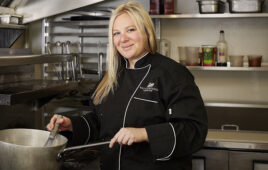Effective time management is essential for club chefs to excel in their roles in the fast-paced and demanding world of club kitchens. We are tasked with numerous responsibilities, from menu planning and ingredient sourcing to overseeing kitchen operations and ensuring member satisfaction. To meet these demands and contribute to the operation’s success, chefs must optimize their time and maximize productivity. This article will explore valuable time management strategies to help club chefs streamline their tasks, enhance efficiency, and elevate their culinary operations.
1. Prioritize Tasks
For many years I have advised my managers: “Do what you have to do, so you can do what you want to do.” Efficient time management begins with effectively prioritizing tasks. Club chefs face a multitude of responsibilities daily, so it’s crucial to identify the most critical and time-sensitive tasks.
Start each day by creating a comprehensive to-do list or using a digital task management tool to organize and prioritize tasks based on deadlines, importance, and potential impact on the operation. While I have eagerly adopted technology in many facets of our operation, few tools serve me better than the sticky note “to do” list on my monitor daily.
By tackling high-priority items first, chefs can allocate their time and energy effectively and prevent becoming overwhelmed.
2. Delegate and Empower Staff
Successful club chefs understand the importance of delegation and empowering their staff.
Geoffrey Lanez, CEC, Executive Chef of The Patterson Club (Fairfield, Conn.), emphasizes recognizing individual growth needs within the team.
“It is crucial to identify areas where team members can take on responsibilities, such as food preparation, inventory management, or overseeing specific kitchen sections,” he says.
Delegating tasks not only alleviates the chef’s workload but also cultivates a sense of ownership and fosters growth among the staff.
Effective communication and training are essential to ensure appropriate task delegation and equip team members with the necessary skills and knowledge. Regular feedback and encouragement empower the staff, increasing productivity and efficiency.
Delegating responsibilities to the brigade frees up the Executive Chef for strategic thinking and prepares team members for larger roles in the future. Creating a “Culinary Administrator” role in larger operations can significantly lighten the workload on the Executive Chef.
3. Efficient Menu Planning
Menu planning is a fundamental aspect of a club chef’s role. Implement strategies such as seasonal menu rotations, ingredient cross-utilization, and standardized recipes to save time and streamline operations.
By designing menus that optimize ingredient availability and minimize waste, chefs can reduce the time spent sourcing ingredients, developing new recipes, and ensuring consistency in culinary offerings.
Collaborate with the culinary team and gather feedback from members to curate menus that cater to their preferences, ensuring member satisfaction and reducing the need for frequent changes. Planning menus so satellite operations share the same preparations can also free up valuable time.
Andrew Haapala, Executive Chef of the multi-property Country Club of Virginia (Richmond, Va.), recognizes the value of cross-utilization of products and maximizes production efficiency using a production team.
“We utilize crab in many different outlets, so we can leverage our buying power for a lower price, then have our production team pick the entire order of crab meat for all teams on property,” he says. “Our production team also prepares soups for the property, prepares staff meals, preps vegetables for other teams, and even assists with a limited amount of butchery.”
4. Streamline Ordering and Inventory Management
Maintaining a well-stocked kitchen is crucial but can be time-consuming without efficient ordering and inventory management practices. Club chefs should establish strong relationships with reliable suppliers and develop a comprehensive ordering system to ensure the timely delivery of quality ingredients.
Implementing inventory management software or systems can accurately track stock levels, minimize waste, and automate reordering processes. Regularly reviewing inventory usage patterns can identify opportunities for improvement and optimize purchasing decisions.
Additionally, conduct regular audits to identify slow-moving or obsolete items and adjust ordering accordingly. There are several automated inventory systems that can lighten the burden of monthly inventory, cost-tracking, and placement of orders on par-stocks.
5. Time Blocking and Productivity Tools
Club chefs can greatly benefit from time-blocking techniques and utilizing productivity tools. Time blocking involves allocating specific blocks of time for different tasks or activities. By designating focused periods for menu planning, staff management, administrative tasks, and creative culinary endeavors, chefs can minimize distractions and work more efficiently.
Create a schedule that allows for dedicated time to handle unexpected challenges that may arise. Utilizing productivity tools such as project management software, scheduling apps, and automation platforms can further streamline operations, improve collaboration, and save valuable time. Explore tools that cater specifically to the hospitality industry to enhance communication, streamline processes, and improve overall efficiency.
6. Continuous Improvement and Self-Reflection
To optimize time management skills and achieve long-term success, chefs should prioritize continuous improvement and self-reflection. Regularly evaluate your time management strategies and identify areas for enhancement. Seek feedback from your team and members to gain insights into areas requiring attention or adjustment.
Consider attending professional development workshops, seminars, or culinary conferences like Chef to Chef Conference that teach time management and organizational skills. These events provide an opportunity to learn from industry experts and gain valuable insights into best practices. Networking with other chefs and sharing experiences can also offer new perspectives and innovative approaches to time management.
In addition, cultivate a culture of learning and growth within your team. Encourage your staff to participate in training programs or workshops that enhance their skills and efficiency. By investing in the development of your team members, you empower them to take on additional responsibilities, which ultimately frees up your time for more strategic tasks.
Furthermore, adopt a mindset of adaptability and flexibility. In the dynamic environment of club kitchens, unexpected situations and challenges are bound to arise. Being able to adjust your priorities and strategies swiftly is essential. Embrace technological advancements that can simplify processes, automate repetitive tasks, and streamline communication within the team.
7. Prioritize self-care.
According to Michael Matarazzo, Executive Chef at Farmington Country Club (Charlottesville, Va.), “Taking care of your physical and mental well-being is crucial for maintaining high productivity and efficiency.”
Ensure you have adequate breaks, schedule time for relaxation and rejuvenation, and maintain a healthy work-life balance. When you are well-rested and mentally refreshed, you can approach your tasks with increased focus and energy.
For club chefs looking to maximize operations and produce excellent results, time management is a crucial skill. You can master the art of time management by setting priorities, assigning tasks, streamlining menu planning and inventory management, utilizing time-blocking techniques and productivity tools, and continuously enhancing and reflecting on your strategies.
As a chef, if you adopt these tactics, you’ll be better prepared to handle the hectic environment of club kitchens while achieving efficiency, productivity, and culinary excellence.



